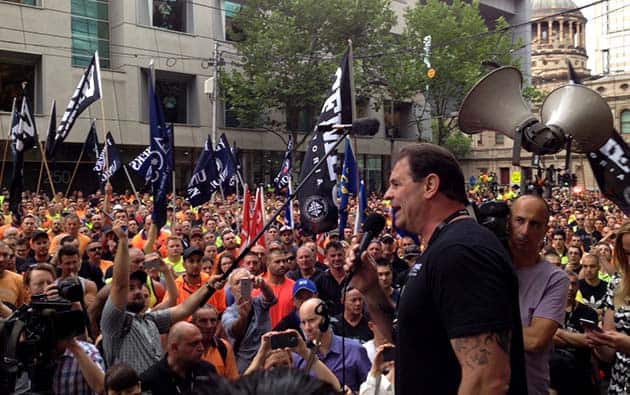After 18 months and almost $46 million dollars, the Trade Union Royal Commission, delivered its final report in December. The Liberal’s loyal servant, Commissioner John Dyson Heydon, delivered volumes of excuses for the Coalition to continue its union bashing.
Predictably, Heydon paints a dark picture of union officials, “But it is clear that in many parts of the world constituted by Australian trade union officials, there is room for louts, thugs, bullies, thieves, perjurers, those who threaten violence, errant fiduciaries and organisers of boycotts.” Not surprisingly, Heydon seems to think that standing up to bosses or organising boycotts is a crime.
Victorian CFMEU secretary, John Setka and assistant secretary, Shaun Reardon, have been charged with “blackmail” for industrial action during Grocon dispute in 2012. A blackmail charge against Canberra CFMEU official John Lomax, for negotiating a pay deal, was dropped in October last year.
But the government will continue to fund Taskforce Heracles, the special Federal and State Police Taskforce attached to the Royal Commission, to pursue investigations and prosecutions of union officials for such “crimes”.
Real target not dodgy officials
The Royal Commission did turn up some officials who ripped off members, and examples of sweetheart deals with particular bosses that shamefully sold rank-and-file members short. The Cleanevent enterprise bargaining deal stitched up by the Victorian AWU officials that cut night shift and weekend penalties is a complete disgrace.
David Hanna, Queensland state secretary of CFMEU resigned after facing allegations that Mirvac paid for extensions on his house. NUW NSW secretary, Derrick Belan, also resigned after allegations that he had misappropriated union money.
But it would be a mistake to think that the Royal Commission was really concerned with rip-off officials or enterprise bargaining deals that cut penalty rates.
The Royal Commission was a union bashing exercise from go to woe, and its recommendations show it is clearly on the side of the bosses.
One of Heydon’s targets is union officials’ right of entry to workplaces. The former High Court judge is outraged that the right of entry is used “as a means to apply industrial pressure and control worksites.”
The right of entry offends his idea of bosses’ property rights as well. He says, “There is much to be said for the abolition of rights of entry, if only because they give such great powers against private landowners, and because they have been so widely abused.”
He then goes on to recommend that the penalty for individual officials breaking right of entry rules be increased from $10,000 to $180,000.
Heydon also proposes law changes to “oblige officials to leave work sites when inspectors are present and investigating possible breaches of industrial or work health and safety laws.”
Although Heydon concludes “abolishing it per se is too radical”, he makes it clear that he would also like to abolish “pattern bargaining” in the construction industry, that is, the practice of enforcing common pay and conditions on all contractors. In the end, he says he will leave it to the Fair Work Act to restrict the unions’ bargaining in this way. But it is a nod and a wink to Turnbull and the bosses.
The Royal Commission also wants to curb enterprise bargaining agreements stipulating industry superannuation funds. In the case of the CFMEU he says “large financial benefits that flow to the CFMEU under pattern enterprise agreements.”
This is not true. What bothers Heydon and Turnbull is that industry funds have unions represented on their boards, and their mates in the financial sector can’t get their hands on union members’ money.
More to come
The recommendations of the Royal Commission are about shackling the unions in more red tape, more regulation and anti-union legislation.
Turnbull says he will take the issue of union reform to the next election. “And,” he says, “We will be going to the members of the unions and we will be saying to them we want you to get a fair deal.” But the idea that Turnbull and the Coalition want workers to have a fair deal is a joke.
The Productivity Commission has already flagged cuts to penalty rates for all hospitality, retail and tourism workers.
The government plans to introduce legislation in February to re-establish the Australian Building and Construction Commission to police the construction industry.
The fight can’t be left to Parliament. In August last year, the anti-union legislation lost in the Senate by just one vote. To beat back Turnbull’s offensive, we will need an industrial campaign of strikes and demonstrations.
By Ian Rintoul






